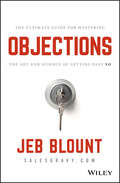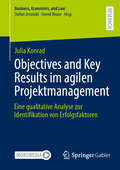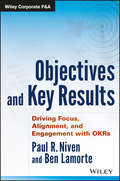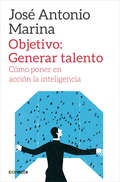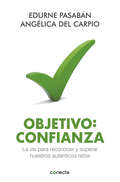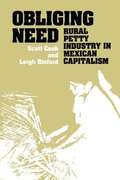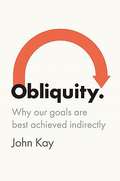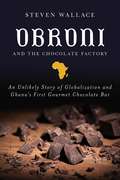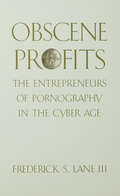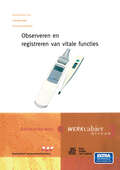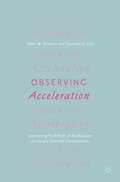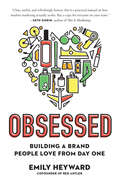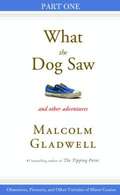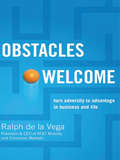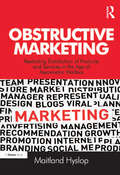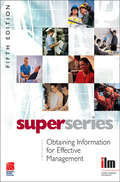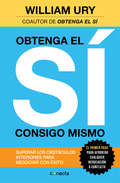- Table View
- List View
Objections: The Ultimate Guide for Mastering The Art and Science of Getting Past No
by Mark Hunter Jeb BlountThere are few one-size-fits-all solutions in sales. Context matters. Complex sales are different from one-call closes. B2B is different than B2C. Prospects, territories, products, industries, companies, and sales processes are all different. There is little black and white in the sales profession. Except for objections. There is democracy in objections. Every salesperson must endure many NOs in order to get to YES. Objections don’t care or consider: Who you are What you sell How you sell If you are new to sales or a veteran If your sales cycle is long or short – complex or transactional For as long as salespeople have been asking buyers to make commitments, buyers have been throwing out objections. And, for as long as buyers have been saying no, salespeople have yearned for the secrets to getting past those NOs. Following in the footsteps of his blockbuster bestsellers Fanatical Prospecting and Sales EQ, Jeb Blount’s Objections is a comprehensive and contemporary guide that engages your heart and mind. In his signature right-to-the-point style, Jeb pulls no punches and slaps you in the face with the cold, hard truth about what’s really holding you back from closing sales and reaching your income goals. Then he pulls you in with examples, stories, and lessons that teach powerful human-influence frameworks for getting past NO - even with the most challenging objections. What you won’t find, though, is old school techniques straight out of the last century. No bait and switch schemes, no sycophantic tie-downs, no cheesy scripts, and none of the contrived closing techniques that leave you feeling like a phony, destroy relationships, and only serve to increase your buyers’ resistance. Instead, you’ll learn a new psychology for turning-around objections and proven techniques that work with today’s more informed, in control, and skeptical buyers. Inside the pages of Objections, you’ll gain deep insight into: How to get past the natural human fear of NO and become rejection proof The science of resistance and why buyers throw out objections Human influence frameworks that turn you into a master persuader The key to avoiding embarrassing red herrings that derail sales calls How to leverage the “Magical Quarter of a Second” to instantly gain control of your emotions when you get hit with difficult objections Proven objection turn-around frameworks that give you confidence and control in virtually every sales situation How to easily skip past reflex responses on cold calls and when prospecting How to move past brush-offs to get to the next step, increase pipeline velocity, and shorten the sales cycle The 5 Step Process for Turning Around Buying Commitment Objections and closing the sale Rapid Negotiation techniques that deliver better terms and higher prices As you dive into these powerful insights, and with each new chapter, you’ll gain greater and greater confidence in your ability to face and effectively handle objections in any selling situation. And, with this new-found confidence, your success and income will soar.
Objectives and Key Results im agilen Projektmanagement: Eine qualitative Analyse zur Identifikation von Erfolgsfaktoren (Business, Economics, and Law)
by Susanne Theresia Weber Julia KonradIn dem vorliegenden Buch werden die Erfolgsfaktoren des agilen Frameworks Objectives and Key Results (OKR) in Scrum-Projekten untersucht. Dabei wird analysiert, welche Faktoren berücksichtigt werden müssen, um OKR effektiv in Scrum-Projekten einzusetzen. Die empirische Untersuchung basiert auf einer umfassenden Literaturrecherche sowie Experteninterviews, die mittels qualitativer Inhaltsanalyse ausgewertet wurden. Die Ergebnisse identifizieren fünf zentrale Handlungsfelder, darunter die Kombination und Synchronisation von OKR und Scrum-Artefakten sowie das Anforderungsmanagement und die Kenntnisse agiler Arbeitsweisen. Basierend auf diesen Erkenntnissen werden praxisrelevante Handlungsempfehlungen abgeleitet, um den erfolgreichen Einsatz von OKR in Scrum-Projekten zu unterstützen.
Objectives and Key Results: Driving Focus, Alignment, and Engagement with OKRs
by Paul R. Niven Ben LamorteEverything you need to implement Objectives and Key Results (OKRs) effectively Objectives and Key Results is the first full-fledged reference guide on Objectives and Key Results, a critical thinking framework designed to help organizations create value through focus, alignment, and better communication. Written by two leading OKRs consultants and researchers, this book provides a one-stop resource for organizations looking to quantify qualitative goals and ensure each team focuses their efforts to make measureable progress on their most important goals. You'll learn how OKRs came to be and how leading companies use them every day to help teams and employees stretch their thinking about what's possible, build their goal-setting muscles and achieve results that reflect their full potential. From the basic framework to a detailed dissection of best practices, this informative guide walks you through real-world implementations to help you get the most out of OKRs. OKRs help employees work together, focus effort, and drive the organization forward. Key results are used to define what it means to achieve broad, qualitative goals, and imperatives like "do it better" are transformed into clear, measureable markers. From the framework's inception in the 1980s to its popularity in today's hyper-competitive environment, OKRs make work more engaging and feature frequent feedback cycles that enable workers to see the progress they make at work each and every day. This book shows you everything you need to know to implement OKRs effectively. Understand the basics of OKRs and their day-to-day use Learn how to gain the executive support critical to a successful implementation Maintain an effective program with key assessment tips Tailor the OKRs framework to your organization's needs Objectives and Key Results is your key resource for designing, planning, implementing, and maintaining your OKRs program for sustainable company-wide success.
Objectives: How to Clarify What You're Really Trying to Achieve With Your Decision
by John S. Hammond Ralph L. Keeney Howard RaiffaThis chapter examines one of the keys to effective decision making: thinking through your objectives to give direction to your decision making.
Objetivo: Cómo poner en acción la inteligencia
by José Antonio MarinaObjetivo: generar talento desarrolla un modelo totalmente innovador para comprender el talento entendido como la inteligencia actuando de manera adecuada, brillante, eficiente; y explica cómo se genera, no solo a nivel individual, sino también de las organizaciones y de las sociedades. «Este es un libro optimista. No con el optimismo un poco bobo de los libros de autoayuda que le prometen que puede ser millonario al instante, sino con el optimismo de la neurociencia que sostiene que nuestras posibilidades son mayores aún de lo que creíamos.»José Antonio Marina Cada año se publican infinidad de índices que miden el talento de las organizaciones, de los países, de las economías, pero a juicio de José Antonio Marina estos estudios presentan un error de enfoque. En todos se menciona el talento como si fuera una piedra preciosa escasa y codiciada por la que hayque pujar; da igual que sea en el mundo empresarial que en el mundo futbolístico: hay que fichar al mejor. Esta idea central de que la riqueza es pastel que hay que repartir, es la antítesis de una visión creadora de la inteligencia, capaz de inventar y ampliar nuestras posibilidades, nuestra riqueza, nuestro talento, que defiende José Antonio Marina en este libro. En Objetivo: generar talento, José Antonio Marina ofrece las claves para pensar mejor, sentir mejor, tomar mejores decisiones y ponerlas en práctica con mayor determinación, para lograr que la guerra por el talento abstracto se convierta en la guerra por las personas que saben generar talento.
Objetivo: La vía para reconocer y superar nuestros auténticos retos
by Edurne Pasabán Angélica del CarpioLa confianza es aprender a equivocarte sin abandonar tu sueño, y sin dejar de ser tú mismo. ¿En qué consiste el éxito auténtico? ¿Cómo podemos mantener la confianza incluso cuando las circunstancias que nos rodean se vuelven adversas? Edurne Pasabán y Angélica Del Carpio, su coach desde hace años, nos muestran a través de Objetivo: confianza cómo podemos encarar los puntos de inflexión en la vida y en nuestras carreras, sin perder de vista nuestros verdaderos sueños. En el libro revivimos la famosa expedición de Edurne al Everest en 2011, sin oxígeno, en la que se enfrentó a situaciones muy comprometidas que le obligaron a tomar decisiones que afectaban al destino de su equipo a la vez que ponían en peligro el éxito de la expedición. A través de las vivencias de la alpinista y la interpretación que nos ofrece Angélica Del Carpio, descubriremos que la mejor brújula para orientarnos en la incertidumbre resulta ser la quereside en nosotros mismos, y que ser fiel a uno mismo y saber definirnos por lo que somos y no por los resultados que obtenemos nos llevará al éxito verdadero. Objetivo: confianza es, por lo tanto, una llamada a la responsabilidad de cada persona de ser dueña de su destino y de recuperar la confianza en su capacidad y talento. El verdadero compromiso de las personas con sus proyectos, y con los objetivos y programas de las organizaciones donde trabajan, es el factor clave para encarar el futuro que queremos. Reseñas:«Edurne y Angélica reflexionan en este libro sobre algo que es de gran actualidad para las empresas: la aceptación de la inseguridad y del cambio permanentes. Y cómo, a través de la confianza, los valores de innovación y flexibilidad que pedimos en las empresas, nos los debemos pedir a nosotros mismos para apasionarnos con lo que hacemos.»Josep Moragas, consejero delegado, ACC1Ó «Esta experiencia de coaching singular es una lección de cómo la confianza en lo que hacemos, nuestras competencias y la pasión nos pueden ayudar a tomar decisiones creativas e innovadoras en situaciones de crisis. ¡Gracias, Edurne y Angélica, por vuestra generosidad al compartirlo!»Pilar Rojo, executive coach y profesora de dirección de personas y coaching del IE Business School «Una muestra real del arte del coaching, que nos aporta una nueva perspectiva de la responsabilidad y del compromiso. Este es un libro práctico, cercano y directo con el que se identificarán personas y organizaciones que quieran afrontar el futuro de manera constructiva.»Manuel Carreras Fisas, presidente de Sport Cultura Barcelona y coach por el IE Business School «Encontramos en este original ejemplo de buen coaching una mirada profunda que analiza la realidad, y que nos propone -y reta- a los individuos y a las empresas a ser protagonistas y creadores de nuevos escenarios, capaces de estar en armonía con los valores y desafíos de una nueva sociedad.»Ramón Agenjo, secretario patrón, Fundación Damm
Obliging Need: Rural Petty Industry in Mexican Capitalism
by Leigh Binford Scott CookFor centuries throughout large portions of the globe, petty agriculturalists and industrialists have set their physical and mental energies to work producing products for direct consumption by their households and for exchange. This twofold household reproduction strategy, according to both Marxist and neoclassical approaches to development, should have disappeared from the global economy as labor was transformed into a producer as well as a consumer of capitalist commodities. But in fact, during the twentieth century, only the United States and Britain seem to have approximated this predicted scenario. Tens of millions of households in contemporary Asia, Africa, and Latin America and millions more in industrialized capitalist economies support themselves through petty commodity production alone or in combination with petty industry wage labor. Obliging Need provides a detailed and comprehensive analysis of small-scale peasant and artisan enterprise in the Oaxaca Valley of Mexico. The authors show how commodity production is organized and operates in different craft industries, as well as the ways in which it combines with other activities such as household chores, agriculture, wage labor, and petty commerce. They demonstrate how--contrary to developmentalist dogma--small-scale capitalism develops from within Mexico's rural economy. These findings will be important for everyone concerned with improving the lives and economic opportunities of countryfolk in the Third World. As the authors make clear, political mobilization in rural Mexico will succeed only as it addresses the direct producers' multiple needs for land, credit, more jobs, health insurance, and, most importantly, more equitable remuneration for their labor and greater rewards for their enterprise. For centuries throughout large portions of the globe, petty agriculturalists and industrialists have set their physical and mental energies to work producing products for direct consumption by their households and for exchange. This twofold household reproduction strategy, according to both Marxist and neoclassical approaches to development, should have disappeared from the global economy as labor was transformed into a producer as well as a consumer of capitalist commodities. But in fact, during the twentieth century, only the United States and Britain seem to have approximated this predicted scenario. Tens of millions of households in contemporary Asia, Africa, and Latin America and millions more in industrialized capitalist economies support themselves through petty commodity production alone or in combination with petty industry wage labor. Obliging Need provides a detailed and comprehensive analysis of small-scale peasant and artisan enterprise in the Oaxaca Valley of Mexico. The authors show how commodity production is organized and operates in different craft industries, as well as the ways in which it combines with other activities such as household chores, agriculture, wage labor, and petty commerce. They demonstrate how--contrary to developmentalist dogma--small-scale capitalism develops from within Mexico's rural economy. These findings will be important for everyone concerned with improving the lives and economic opportunities of countryfolk in the Third World. As the authors make clear, political mobilization in rural Mexico will succeed only as it addresses the direct producers' multiple needs for land, credit, more jobs, health insurance, and, most importantly, more equitable remuneration for their labor and greater rewards for their enterprise.
Obliquity
by John KayA leading economist charts the indirect road to happiness and wealth. Using dozens of practical examples from the worlds of business, politics, science, sports, literature, even parenting, esteemed economist John Kay proves a notion that feels at once paradoxical and deeply commonsensical: The best way to achieve any complex or broadly defined goal-from happiness to wealth to profit to preventing forest fires-is the indirect way. As Kay points out, we rarely know enough about the intricacies of important problems to tackle them head-on. And our unpredictable interactions with other people and the world at large mean that the path to our goals-and sometimes the goals themselves-will inevitably change. We can learn about our objectives and how to achieve them only through a gradual process of risk taking and discovery-what Kay calls obliquity. Kay traces this pathway to satisfaction as it manifests itself in nearly every aspect of life. The wealthiest people-from Andrew Carnegie to Bill Gates-achieved their riches through a passion for their work, not because they set materialistic goals. Research has shown that companies whose goal (as declared in mission statements) is excellent products or service are more profitable than companies whose stated goal is increasing profits. In the personal realm, a large body of evidence shows that parenthood is on a daily basis far more frustrating than happy- making. Yet parents are statistically happier than nonparents. Though their short-term pleasure is often thwarted by the demands of childrearing, the subtle-oblique-rewards of parenthood ultimately make them happier. Once he establishes the ubiquity of obliquity, Kay offers a wealth of practical guidance for avoiding the traps laid by the direct approach to complex problems. Directness blinds us to new information that contradicts our presumptions, fools us into confusing logic with truth, cuts us off from our intuition (which is the subconscious expression of our experience), shunts us away from alternative solutions that may be better than the one we're set on, and more. Kay also shows us how to acknowledge our limitations, redefine our goals to fit our skills, open our minds to new data and solutions, and otherwise live life with obliquity. This bracing manifesto will convince listeners-or confirm their conviction-that the best route to satisfaction and success does not run through the bottom line.
Obra selecta
by Salomón KalmanovitzEste libro reúne por primera vez los ensayos más influyentes de Salomón Kalmanovitz en el que se analiza el país desde una acertada perspectiva económica. Salomón Kalmanovitz es uno de los principales historiadores de la economía colombiana este libro constituye una mirada en conjunto en la que destaca una historia de la economía y de las ideas, así como sólidas hipótesis sobre la lenta construcción del Estado colombiano, la macroeconomía marxista, el desarrollo financiero y la inestabilidad financiera aplicada a la realidad colombiana. Este libro abre con una autobiografía intelectual y un ensayo dedicado al orden social y la construcción del Estado en Colombia, escritos especialmente para el volumen. En total son doce artículos cuya escala temporal comprende desde el siglo XVIII hasta primera década del Siglo XXI.
Obroni and the Chocolate Factory: An Unlikely Story of Globalization and Ghana's First Gourmet Chocolate Bar
by Steven WallaceWhat country makes the best chocolate? Most people would answer "Switzerland," or, if they're discerning, "Belgium" or "France." But, how many cocoa trees grow in Zurich? Lyon? Antwerp? Shouldn't the country known for growing the best cocoa beans be the one that makes the best chocolate? So, captivated by theories of international trade but with precious little knowledge of cocoa or chocolate, Steven Wallace set out to build the Omanhene Cocoa Bean Company in Ghana—a country renowned for its cocoa and where Wallace spent part of his youth—in a quest to produce the world's first export-ready, single-origin chocolate bar. What followed would be the true story of an obroni—white person—from Wisconsin taking on the ultimate entrepreneurial challenge. Written with sensitivity and devastating self-awareness, Obroni and the Chocolate Factory is Steven's chaotic, fascinating, and bemusing journey to create a successful international business that aspired to do a bit of good in the world. This book is at once a penetrating business memoir and a story about imagining globalism done right. Wallace's picaresque journey takes him to Ghana's residence for the head of state, to the Amsterdam offices of a secretive international cocoa conglomerate, and face-to-face with key figures in the sharp-elbowed world of global trade and geopolitics. Along the way he'll be forced to deal with bureaucratic roadblocks, a legacy of colonialism, corporate intrigue, inscrutable international politics, a Bond-esque villain nemesis, and constant uncertainty about whether he'll actually pull it off. This rollicking love letter to both Ghana and the world of business is a rare glimpse into the mind of an unusually literate and articulate entrepreneur.
Obscene Profits: Entrepreneurs of Pornography in the Cyber Age
by Frederick S. LaneSex sells. Already a ten-billion dollar business-and growing-most sex businesses require relatively low start-up costs and minimal equipment. No wonder retired porn stars, homemakers, college students, and entrepreneurs of every stripe are eager to jump on the smut band wagon. Following the money trail, or in this case, the telecom routes, the author reveals how some big phone companies are cashing in too. Obscene Profits offers a startling and entertaining new look at this very old business, and shows why pornography, in all of its variations--videos, magazines, phone-sex, spy cameras, etc.-- is one of the most profitable and popular new careers to come out of the electronic age.
Observations on the President's Fiscal Year 1999 Federal Science and Technology Budget
by Committee on Science Engineering Public PolicyA report on Observations on the President's Fiscal Year 1999 Federal Science and Technology Budget
Observations on the President's Fiscal Year 2002 Federal Science and Technology Budget
by Institute of MedicineFourth in a series of annual reports, this study provides observations on the Administration's FY 2002 budget proposal for federal science and technology (FS&T) programs. The report comments first on approaches to tabulating federal spending on FS&T and endorses the Administration's method for developing an FS&T budget cross-tabulation for inclusion in its budget proposal. The report then provides observations on the FY 2002 FS&T budget proposal, identifying changes in FS&T investments by federal agencies from the prior year; and assessing the longer-term impacts of these FS&T proposals in various fields.
Observeren en registreren van vitale functies: Werkcahier Kwalificatieniveau 3, Basiszorg deel 3 (Skillslab-serie)
by Geerard Siereveld Johan van 't Wout Cees Van StipdonkObserveren en registreren van vitale functies: Werkcahier Kwalificatieniveau 3, Basiszorg deel 3 (Skillslab-serie)
Observing Acceleration: Uncovering the Effects of Accelerators on Impact-Oriented Entrepreneurs
by Peter W. Roberts Saurabh A. Lall Randall KempnerThis book summarizes five years of learning from data collected as part of the Global Accelerator Learning Initiative. The authors present data describing impact-oriented ventures and accelerators that operate in both high-income countries and in emerging markets. Blending survey data with insights from sector experts, their various analyses shed light on the basic structure of accelerators, showing where they are having their most promising results. Unlike previous studies, this book does not focus on a few high-profile accelerators (like TechStars and Y Combinator) and startups (like AirBnB and Uber). Instead, it compares a range of accelerator programs that target specific impact areas, challenging regions, and marginalized entrepreneurs. Therefore, it serves as a valuable tool for scholars, policymakers, and practitioners interested in the effectiveness of accelerator programs as tools that unleash the economic potential currently trapped in entrepreneurial dead spaces.
Obsessed: Building a Brand People Love from Day One
by Emily HeywardThe cofounder and chief branding officer of Red Antler, the branding and marketing company for startups and new ventures, explains how hot new brands like Casper, Allbirds, Sweetgreen, and Everlane build devoted fan followings right out of the gate.We're in the midst of a startup revolution, with new brands popping up every day, taking over our Instagram feeds and vying for our affection. Every category is up for grabs, and traditional brands are seeing their businesses erode as hundreds of small companies encroach on their territory, each hoping to become the next runaway success. But it's not enough to have a great idea, or a cool logo. Emily Heyward founded Red Antler, the Brooklyn based brand and marketing company, to help entrepreneurs embed brand as a driver of business success from the beginning. In Obsessed, Heyward outlines the new principles of what it takes to build and launch a brand that has people queuing up to buy it on opening day. She takes you behind the scenes of the creation of some of today's hottest new brands, showing you: • How Casper was able to upend the mattress industry by building a beloved brand where none had existed before • How the dating app Hinge won a fanatical user base and great word-of-mouth with the promise that the app was "designed to be deleted" • Why luggage startup Away, now valued at $1.4 billion, could build their brand around love of travel by launching with just one product--a hard-shell carry-on suitcase--rather than a whole range of luggage offerings.Whether you're starting a new business, launching a new product line, or looking to refresh a brand for a new generation of customers, Obsessed shows you why the old rules of brand-building no longer apply, and what really works for today's customers.
Obsessives, Pioneers, and Other Varieties of Minor Genius: Part One from What the Dog Saw
by Malcolm GladwellWhat is the difference between choking and panicking? Why are there dozens of varieties of mustard-but only one variety of ketchup? What do football players teach us about how to hire teachers? What does hair dye tell us about the history of the 20 th century? In the past decade, Malcolm Gladwell has written three books that have radically changed how we understand our world and ourselves:The Tipping Point;Blink; andOutliers.Now, inWhat the Dog Saw, he brings together, for the first time, the best of his writing fromTheNew Yorkerover the same period. Here is the bittersweet tale of the inventor of the birth control pill, and the dazzling inventions of the pasta sauce pioneer Howard Moscowitz. Gladwell sits with Ron Popeil, the king of the American kitchen, as he sells rotisserie ovens, and divines the secrets of Cesar Millan, the "dog whisperer" who can calm savage animals with the touch of his hand. He explores intelligence tests and ethnic profiling and "hindsight bias" and why it was that everyone in Silicon Valley once tripped over themselves to hire the same college graduate. "Good writing," Gladwell says in his preface, "does not succeed or fail on the strength of its ability to persuade. It succeeds or fails on the strength of its ability to engage you, to make you think, to give you a glimpse into someone else's head."What the Dog Sawis yet another example of the buoyant spirit and unflagging curiosity that have made Malcolm Gladwell our most brilliant investigator of the hidden extraordinary.
Obstacles Welcome
by Ralph De VegaRalph de la Vega, President and CEO of AT&T Mobility and Consumer Markets, shares the lessons learned in business and in life along the journey from Cuba to Corporate America. Ralph de la Vega arrived in the United States from Cuba in 1962. He was alone. He was scared. He was 10. Separated from his parents by Cuban authorities just moments before they were to board a plane to Miami, de la Vega was baptized early--and abruptly--in the waters of adversity. It would be four long years before his mother, father, and sister gained legal passage to America. But while the boy would never have chosen such circumstance, it's the man who can look back and say he would not have changed it. In Obstacles Welcome, de la Vega recounts his journey as a young Cuban immigrant to president and CEO of AT&T Mobility and Consumer Markets, a subsidiary of AT&T Inc. (NYSE: T). A frontliner in the converging worlds of technology and communications, de la Vega takes readers behind the scenes of the Internet revolution, shares insights from the nation's top technology companies, and chronicles the incredible obstacles intrinsic to successfully merging the largest wireless operations in U.S. history--those of Cingular Wireless and AT&T Wireless. Obstacles Welcome is an innovation manifesto for those committed to bigger thinking and greater results both professionally and personally. He clearly defines how to: * Create a detailed action plan to boost success * Identify and take calculated risks without fear * Create a values-centric, decisive leadership style * Transform vision into measurable results * Recognize opportunities and overcome obstacles * Communicate well and build alignment * Unlearn thinking that hinders innovation * Dream big and throw off mental limits once and for all Opening a powerful cache of business strategy and in-the-trenches wisdom, de la Vega illustrates that within each obstacle we encounter, there's an opportunity that carries the potential to transform our thinking, our organizations, our communities, and our world. PRAISE FOR OBSTACLES WELCOME ". . . [T]hrough his compelling story, Ralph shows how to turn almost any challenge into the opportunity of a lifetime. This is great insight for any professional or any young person aspiring to learn how to overcome obstacles and accept new challenges." -- Randall Stephenson, Chairman & CEO, AT&T, Inc. "I recommend this book to those looking to improve their opportunities, as well as those providing leadership in this diverse society." -- Ambassador Andrew Young, former U.S. Ambassador to the United Nations, former Mayor of Atlanta, former president of the National Council of Churches "His journey is an inspirational story of leadership vision and the ability to achieve success in the face of enormous challenges and obstacles." -- Gerry Czarnecki, President, CEO & Managing Partner, O2Media "This book is a must-read for anyone not afraid to make your dreams come true, regardless of where you are in your professional or personal life." -- Ernest Bromley, Chairman and CEO, Bromley Communications, LLC "Without a doubt, this is one of the most inspiring books and one of the best business publications that I've read in my 40-plus years in the communications business." -- John Graham, Chairman, Fleishman-Hillard Inc. "Ralph de la Vega tells an All-American story for our times." -- Henry Cisneros, Executive Chairman, CityView; former U.S. Secretary of Housing and Urban Development; former Mayor of San Antonio
Obstacles to Ethical Decision-Making
by Patricia H. Werhane Michael S. Pritchard Laura Pincus Hartman Crina Archer Elaine E. EnglehardtIn commerce, many moral failures are due to narrow mindsets that preclude taking into account the moral dimensions of a decision or action. In turn, sometimes these mindsets are caused by failing to question managerial decisions from a moral point of view, because of a perceived authority of management. In the 1960s, Stanley Milgram conducted controversial experiments to investigate just how far obedience to an authority figure could subvert his subjects' moral beliefs. In this thought-provoking work, the authors examine the prevalence of narrow mental models and the phenomenon of obedience to an authority to analyse and understand the challenges which business professionals encounter in making ethical decisions. Obstacles to Ethical Decision-Making proposes processes - including collaborative input and critique - by which individuals may reduce or overcome these challenges. It provides decision-makers at all levels in an organisation with the means to place ethical considerations at the heart of managerial decision-making.
Obstructive Marketing: Restricting Distribution of Products and Services in the Age of Asymmetric Warfare
by Maitland HyslopIn Obstructive Marketing, Maitland Hyslop deals with a very negative kind of activity which embraces activities, legal or otherwise, designed to prevent or restrict the distribution of a product or service, temporarily or permanently, against the wishes of the product manufacturer, service provider or customer. When the author defined this phenomenon as Obstructive Marketing and started to research it more than a decade ago, it was seen as a valid concept that was perhaps ahead of its time. The World has moved on and in the era of globalization a study of this negative aspect of marketing is now required. Obstructive Marketing is now seen as the business equivalent of asymmetric warfare, which is increasingly understood because the rise of the South and East at the expense of the North and West has brought some Obstructive Marketing stratagems into sharp focus. Using the author’s own research, this book explains what Obstructive Marketing is and why it is not called Anti-Marketing. The author explains who practises Obstructive Marketing, where, when and how; and why businesses are particularly vulnerable when entering new markets and engaging in change and innovation. Intriguing concepts such as cultural risk are illuminated along with formal links between Obstructive Marketing, asymmetric warfare and terrorism. This all leads to identification of the need for a strong Government/Business partnership to counter the effects of this darkest kind of marketing.
Obtaining Information for Effective Management (Institute of Learning & Management Super Series)
by Institute of Leadership & ManagementSuper series are a set of workbooks to accompany the flexible learning programme specifically designed and developed by the Institute of Leadership & Management (ILM) to support their Level 3 Certificate in First Line Management. The learning content is also closely aligned to the Level 3 S/NVQ in Management. The series consists of 35 workbooks. Each book will map on to a course unit (35 books/units).
Obtaining Life-Cycle Cost-Effective Facilities in the Department of Defense
by Clifford A. Grammich Katharine Watkins Webb Constantine Samaras Abigail HaddadThe Department of Defense (DoD) constructs, operates, and maintains a large number of facilities. DoD incorporates life-cycle cost-effective practices into many aspects of the military planning and construction processes. This report provides RAND’s description and assessment of the process used to obtain life-cycle cost-effective facilities and how that affects DoD construction options and choices.
Obtenga el sí consigo mismo: Superar los obstáculos interiores para negociar con éxito
by William UryEl primer paso para afrontar cualquier negociación o conflicto. William Ury, coautor del clásico best seller Obtenga el sí, ha enseñado a decenas de miles de personas de todos los ámbitos profesionales cómo mejorar su capacidad de negociación. A lo largo de estos años, Ury ha descubierto que el mayor obstáculo para alcanzar unos acuerdos provechosos y unas relaciones satisfactorias no está en nuestra contraparte, por difícil que esta resulte. El mayor obstáculo reside en nosotros mismos, en nuestra tendencia natural a reaccionar de una forma contraria a nuestros intereses. Sin embargo, este obstáculo se puede convertir en nuestro mejor aliado. Si aprendemos primero a comprendernos y a controlarnos, estamos poniendo la base para comprender e influenciar a los demás. En esta precuela indispensable de Obtenga el sí, Ury parte de su experiencia personal y profesional como negociador en conflictos bélicos paradesarrollar un método práctico que permite conquistar primero el sí con uno mismo, e incrementar de esta forma la capacidad para conseguir el sí de los demás. Útil y sencillo, Obtenga el sí consigo mismo es una guía esencial para alcanzar la satisfacción interior, a partir de la cual podrá mantener unas relaciones más sanas, una familia más feliz, un trabajo más productivo y un entorno más pacífico. Reseñas:«Inteligente y realista, noble y práctico, brillante y cercano. Ury ha desarrollado un planteamiento global para alcanzar el sí en un mundo tan conflictivo como el nuestro. Este libro se centra en la negociación más dura de todas: la que hacemos con nosotros mismos. Una vez más, Ury ha realizado una gran contribución con su trabajo.»Jim Collins, autor de Empresas que sobresalen «He aquí nuestro peor enemigo en cualquier mesa de negociación: nosotros mismos. Ury ha escrito una imprescindible precuela de Consiga el sí. Si usted adopta las estrategias de este libro conseguirá avanzar en su vida y en su carrera.»Daniel H. Pink, autor de La sorprendente verdad sobre qué nos motiva «Ury nos ofrece un planteamiento que refuerza nuestra confianza y que nos aporta una sensación de energía y realización personal. Todos seremos más eficaces si empezamos las negociaciones por nosotros mismos antes que con los demás.»Joanna Barsh, directora emérita de McKinsey & Company
Ocado
by David E. Bell Jose B. Alvarez Damien P. McloughlinIn 2015, U.K.-based Ocado was the world's largest pure player in the online home-delivery grocery business and was gaining a growing share of the highly competitive U.K. grocery market. Ocado had made heavy investments in technology, including a highly automated warehouse operation, intelligent software for efficient order delivery, and a customer-friendly online interface. Ocado's customer base had expanded beyond the wealthy to include middle-income consumers; even with a delivery charge, grocery shopping through Ocado was, in many cases, as affordable as shopping in a retail stores. In 2015 the company was developing a strategy for its Smart Platform, a model in which Ocado would lease its software, hardware, and integration services to brick-and-mortar grocery retailers seeking to build online businesses. Ocado's management believed the Smart Platform, which they planned to market internationally, had the potential to disrupt the global grocery retail market.
